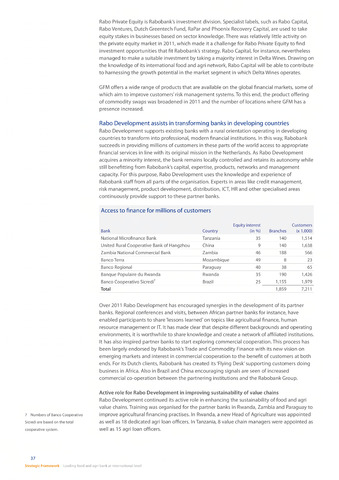Rabo Private Equity is Rabobank's investment division. Specialist labels, such as Rabo Capital,
Rabo Ventures, Dutch Greentech Fund, RaPar and Phoenix Recovery Capital, are used to take
equity stakes in businesses based on sector knowledge.There was relatively little activity on
the private equity market in 2011, which made it a challenge for Rabo Private Equity to find
investment opportunities that fit Rabobank's strategy. Rabo Capital, for instance, nevertheless
managed to make a suitable investment by taking a majority interest in Delta Wines. Drawing on
the knowledge of its international food and agri network, Rabo Capital will be able to contribute
to harnessing the growth potential in the market segment in which Delta Wines operates.
GFM offers a wide range of products that are available on the global financial markets, some of
which aim to improve customers' risk management systems. To this end, the product offering
of commodity swaps was broadened in 2011 and the number of locations where GFM has a
presence increased.
Rabo Development assists in transforming banks in developing countries
Rabo Development supports existing banks with a rural orientation operating in developing
countries to transform into professional, modern financial institutions. In this way, Rabobank
succeeds in providing millions of customers in these parts of the world access to appropriate
financial services in line with its original mission in the Netherlands. As Rabo Development
acquires a minority interest, the bank remains locally controlled and retains its autonomy while
still benefitting from Rabobank's capital, expertise, products, networks and management
capacity. For this purpose, Rabo Development uses the knowledge and experience of
Rabobank staff from all parts of the organisation. Experts in areas like credit management,
risk management, product development, distribution, ICT, FIR and other specialised areas
continuously provide support to these partner banks.
Access to finance for millions of customers
Equity interest
Customers
Bank
Country
(in
Branches
(x 1,000)
National Microfinance Bank
Tanzania
35
140
1,514
United Rural Cooperative Bank of Flangzhou
China
9
140
1,638
Zambia National Commercial Bank
Zambia
46
188
566
Banco Terra
Mozambique
49
8
23
Banco Regional
Paraguay
40
38
65
Banque Populaire du Rwanda
Rwanda
35
190
1,426
Banco Cooperativo Sicredi7
Brazil
25
1,155
1,979
Total
1,859
7,211
Over 2011 Rabo Development has encouraged synergies in the development of its partner
banks. Regional conferences and visits, between African partner banks for instance, have
enabled participants to share'lessons learned'on topics like agricultural finance, human
resource management or IT. It has made clear that despite different backgrounds and operating
environments, it is worthwhile to share knowledge and create a network of affiliated institutions.
It has also inspired partner banks to start exploring commercial cooperation.This process has
been largely endorsed by Rabobank's Trade and Commodity Finance with its new vision on
emerging markets and interest in commercial cooperation to the benefit of customers at both
ends. For its Dutch clients, Rabobank has created its 'Flying Desk' supporting customers doing
business in Africa. Also in Brazil and China encouraging signals are seen of increased
commercial co-operation between the partnering institutions and the Rabobank Group.
Active role for Rabo Development in improving sustainability of value chains
Rabo Development continued its active role in enhancing the sustainability of food and agri
value chains. Training was organised for the partner banks in Rwanda, Zambia and Paraguay to
7 Numbers of Banco cooperativo improve agricultural financing practises. In Rwanda, a new Flead of Agriculture was appointed
sicredi are based on the total as well as 18 dedicated agri loan officers. In Tanzania, 8 value chain managers were appointed as
cooperative system. well as 15 agri loan officers.
37
Strategic Framework Leading food and agri bank at international level

